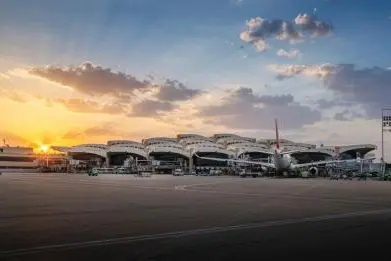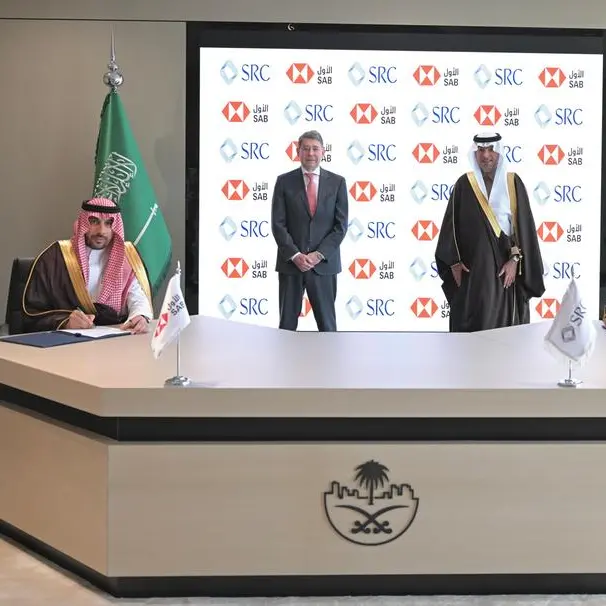PHOTO
Riyadh, Saudi Arabia : In a move that reflects the company’s commitment to sustainable development, Riyadh Airports Company, which manages and operates King Khalid International Airport (KKIA) in Riyadh, announced that the airport has been rewarded for its environmental protection and carbon management strategy, by successfully obtaining a certification from the Airport Carbon Accreditation program provided by the Airports Council International.
This achievement reflects Riyadh Airport Company’s commitment to reducing carbon emissions and adopting the best international standards to become cleaner and more efficient, by determining the source of emissions within the operational boundary of the airport, calculating the annual carbon emissions and compiling a carbon footprint report, as well as adhering to the necessary measures to reduce pollution and launching a number of green initiatives and programs, in line with the Kingdom's vision for sustainable development, and reducing carbon emissions, reaching to carbon neutrality (zero percent net carbon emissions) by 2060.
Commenting on this achievement, Eng. Mohammed bin Abdullah Al-Maghlouth, CEO of Riyadh Airports Company said: “We are keen at RAC to adopt and apply the best international standards that protect and preserve the environment. Obtaining this certificate proves the airport’s commitment to confront climate change and reducing carbon emissions. These international specialized certificates will contribute to raising the airport’s classification worldwide. This achievement reflects the continuous support that Riyadh Airports Company and KKIA receive from the General Authority of the Saudi Civil Aviation and Matarat Holding Company in all fields.”
Al-Maghlouth added, "We will move forward with our environmental initiatives in compliance with the best international aviation standards, and we will complete the carbon emissions management accreditation program, which includes mapping, reduction, optimization, and transformation, until achieving neutrality."
Riyadh Airports Company is a member of Airports Council International Asia-Pacific and it is noteworthy that the Airport Carbon Accreditation program is the world’s only institutionally endorsed program that independently assesses and recognizes airport’s efforts to manage and reduce their CO2 emissions.
It is worth mentioning that global certificates specialized in safety, health, environment and carbon emissions, are considered among the developmental and legislative requirements globally and a unified global language known to all international organizations and companies. It contributes to raising the level of airport classification in the world, increasing the travelers’ confidence, and improving their experience through the approved standards.
-Ends-
About Riyadh Airports Company (RAC):
Riyadh Airports Company (RAC) was established in 2016 as part of the Kingdom of Saudi Arabia’s privatization of the aviation sector. Currently managing operations at King Khalid International Airport in the Saudi Arabian capital, RAC’s vision is to become a regional pioneer in airport management. The team at RAC is currently working on cementing its position as a leader in the civil aviation sector, as it manages a world-class center for passengers, cargo customers and partners. For more information, please visit www.riyadhairports.com
About the King Khalid International Airport:
King Khalid International Airport was opened in 1983 in the Saudi Arabian capital of Riyadh. Spanning an area of 375 km2, located 35 km from the city center, the airport contains five passenger terminals, 40 passenger boarding bridges, and a car park with the capacity for 11,600 vehicles. The airport consists of the Royal Terminal, the central control tower, two parallel runways, each of which is 4,260 meters (13,980 ft) long.
Over 51 international and domestic airlines operate through King Khalid International Airport, travelling to more than 105 destinations. With more than 217,000 flights taking off annually from King Khalid International Airport, the facility serves more than 28.5 million passengers annually.
About ACI Asia-Pacific
ACI Asia-Pacific, one of the five regions of the Airports Council International (ACI), is based in Hong Kong and represents 127 members operating 611 airports in 49 countries/ territories in Asia-Pacific and the Middle-East. As the only global trade association of the world’s airports, ACI represents airports’ interests with governments and international organizations, develops standards, policies and recommended practices for airports, and provides information and training opportunities to raise standards around the world.
© Press Release 2022
Disclaimer: The contents of this press release was provided from an external third party provider. This website is not responsible for, and does not control, such external content. This content is provided on an “as is” and “as available” basis and has not been edited in any way. Neither this website nor our affiliates guarantee the accuracy of or endorse the views or opinions expressed in this press release.
The press release is provided for informational purposes only. The content does not provide tax, legal or investment advice or opinion regarding the suitability, value or profitability of any particular security, portfolio or investment strategy. Neither this website nor our affiliates shall be liable for any errors or inaccuracies in the content, or for any actions taken by you in reliance thereon. You expressly agree that your use of the information within this article is at your sole risk.
To the fullest extent permitted by applicable law, this website, its parent company, its subsidiaries, its affiliates and the respective shareholders, directors, officers, employees, agents, advertisers, content providers and licensors will not be liable (jointly or severally) to you for any direct, indirect, consequential, special, incidental, punitive or exemplary damages, including without limitation, lost profits, lost savings and lost revenues, whether in negligence, tort, contract or any other theory of liability, even if the parties have been advised of the possibility or could have foreseen any such damages.



















